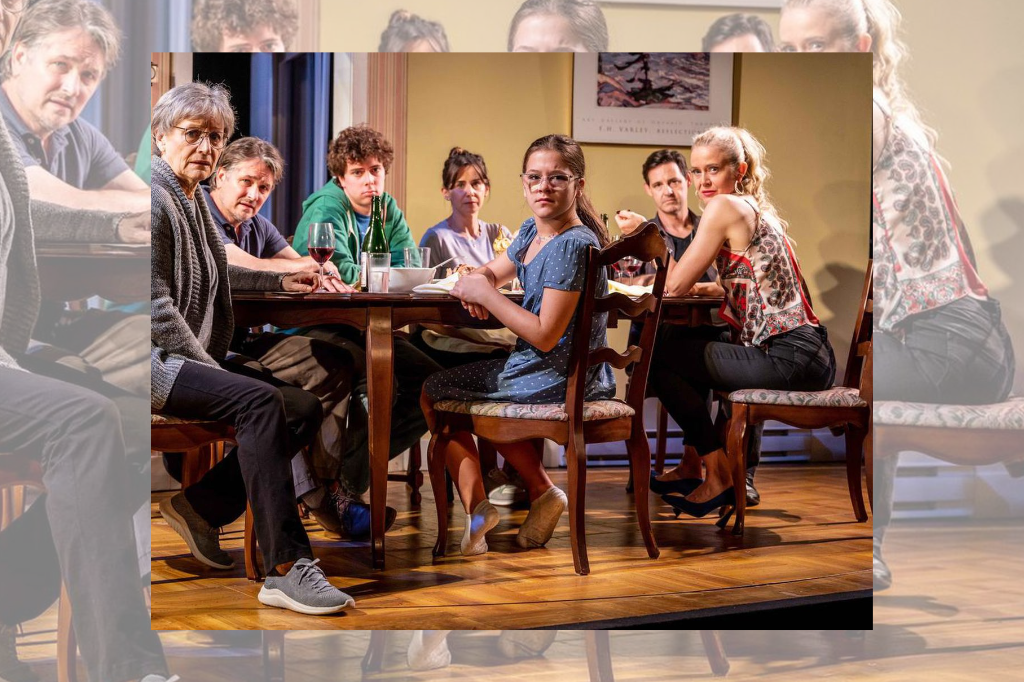REVIEW: Public Enemy at Canadian Stage
Dinner-scene-gone-wrong’s a reliable formula for entertainment: see Ayad Akhtar’s Disgraced, Kaufman and Hart’s You Can’t Take It With You, hell, even The Office. (Or — last one — last season’s excellent French translation of Roland Schimmelpfennig’s Winter Solstice at Théâtre français de Toronto). Public Enemy at Canadian Stage sees the dramatic potential in a ruptured family meal and runs with it — with more than a few chuckles along the way — and ultimately speaks to a Canada where political identities have calcified into bitterness, drawing lines between family members and alienating younger generations.
It’s a quintessential (white) Canadian family: there’s Olivia (Maja Vujicic), the young daughter of the clan, and her hovering mother, Melissa (Michelle Monteith); teenage Tyler (Finley Burke) and his father James (Jonathan Goad); and rudderless, mid-life Daniel (Matthew Edison), conspicuously single in the play’s first act (a situation rectified later by Amy Rutherford’s Suzie). The matriarch, Elizabeth (Rosemary Dunsmore), is mother to the three adults and a doting grandmother to little Olivia, but the realities of living alone as an elderly woman are slowly bubbling to the top of her everyday existence.
So sets the scene for family supper, a battle of overlapping lines and opposing views. This 2022 Canada isn’t the Canada Elizabeth grew up with, and it certainly doesn’t embody the values of her youth — the values she assumed she’d instilled into her own children. Invoking only a little whiplash with its breakneck dialogue (which makes up a solid chunk of the play), Public Enemy lobs political discourse at its audience with ease, while Olivia the eleven-year-old slowly devolves into rabidity (as facilitated by a squirrel puppet,int operated by actor Edison). The family swells and splinters; whirrs and stagnates; simmers and boils over — we watch the same moment replay in separate rooms, offering us precious insight into each character’s psyche.
It’s a tense affair, Public Enemy. Director Brendan Healy ekes out more than a few Little Miss Sunshine references in his clever take on Olivier Choinière’s text, in an English translation by Bobby Theodore. A repeated, enormous projection of young Olivia’s face mirrors the 2006 film’s opening sequence, and despite the decidedly grown-up topics the text traverses, we often follow the events of the play through Olivia’s point of view (just as we do Olive in her on-screen dysfunctional family). The Sunshine-ness is a joint effort from Choinière and Healy, and it’s an effective one. The parallels between play and film here are quite marked — Public Enemy feels like a palimpsest through which we can see the decades’ worth of dinner-plays and movies which came before it. Notably, it’s a translation — and at times I did have to wonder if something was lost on the journey from French to English, as the dialogue often felt wild and unfollowable, chaotic by accident rather than by design — but for the most part, Healy’s wrangled Bobby Theodore’s adaptation into a clear directorial vision. Perhaps we’re not meant to catch every conversation, every nuance; so goes discourse in the real world.
Performances across the board are layered and endlessly watchable, most notably Edison’s Daniel and Goad’s James. The brothers are somehow tasked with being the glue of this high-drama family, but that bond is constantly at risk of falling apart — and both Edison and Goad seamlessly portray the tightrope that is familial obligation versus personal self-preservation. Vujicic’s Olivia and Burke’s Tyler seem rooted in appropriate teenage malaise, and that’s no small feat, as much of the action of these roles unfurls in the background of the more grown-up dialogue. Production elements too are uniformly strong — Julie Fox’s neat rotating set, Kimberly Purtell’s naturalistic lighting, Richard Feren’s sound, Ming Wong’s costumes — and effectively suggest the unpleasant environment of the play.
A little dense, a bit wild, Public Enemy holds a mirror up to any number of families who might be watching from the audience — the lengthy scenes have roots in real-life cringe. Just who might be the “public enemy” — the bogeyman of Canadian politics? Who’s skewering traditional values, imbuing our children with the instinct to bite their enemies? I’m not sure the play answers that question — but it asks it with such realistic and lawless fervour that I don’t think I mind.
Public Enemy runs at Canadian Stage through October 8. Tickets are available here.















Comments